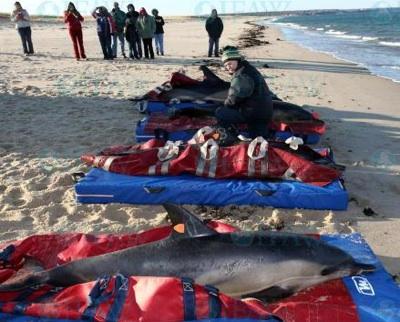One of the largest cases of dolphin strandings ever noted recently occurred on Cape Cod, with nearly 60 Common dolphins coming ashore on the backside of Cape Cod National Seashore and prompting an ambitious rescue effort by the International Fund for Animal Welfare.
The Fund's Marine Mammal Rescue and Research Team was able to rescue and return to the ocean 19 of 27 dolphins that came ashore late last week. Another 32 that came ashore were found dead, according to an IFAW release.
"I've been doing this for 15 years and this is only the second season I've seen it like this," said Katie Moore, IFAW's Marine Mammal Rescue and Research manager. "These types of lingering mass strandings seem to be unique to our area.
"No one knows for sure why animals strand, but mass strandings of whales and dolphins have happened on Cape Cod for hundreds of years," she added. "The topography of the Cape is likely a factor, with its hook-like shape, gently sloping beaches and extensive sand and mud flats. Animals may become disoriented and trapped by the complex inlets. Dolphins are also very social animals and stick together for better or worse."
The stranded dolphins were found on beaches from Dennis to Wellfeet. The first was found stranded near Wellfleet last Thursday, and the strandings continued through Monday. Approximately 40 dolphins stranded on Saturday alone, the IFAW reported. The dolphins that survived were released back into Cape Cod Bay.
"The scale of this mass stranding is unique. We've responded to dolphins along 25 miles of coastline during the past few days," said Brian Sharp, IFAW Stranding Coordinator. "We were able to affix satellite tags to the dorsal fins of five rescued dolphins, which will allow us to find out how they're doing after release. We're hoping to see that the location coordinates are grouped together, which will show that they've rejoined a pod."
Along with sites in Australia and New Zealand, Cape Cod is one of the top three stranding hotspots in the world, the IFAW said. Mass strandings of multiple marine animals often occur in this area between January and April, it added. If you see a live or dead stranded marine mammal south of Plymouth, Massachusetts, through Rhode Island, you're asked to report it to the IFAW emergency hotline at 508-743-9548.




Add comment